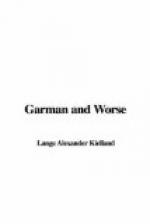Woodlouse was guiltless of inattention, for he could not hear; but instead, he made his observations and gave vent to his philosophical reflections as was his wont.
There lay, in the gravelly heap which had been thrown up from the grave, a few bones and skulls. The story was, that that part of the churchyard, which was especially devoted to the poor, had been a burying-place at some former period, and the graves which had not been paid for for twenty years were, after the lapse of that time, again made use of, according to the rule and custom of the Church. It was thus no unusual thing to find coffins while a new grave was being dug, which fell to pieces under the spade. The bodies had been packed closely, and often several had been placed in the same grave.
It was, however, a scandal that the bones should be allowed to lie out in the light of day, until the new corpse came to be buried. Abraham the sexton had his orders, to take such bones at once to the house which was appointed for them, and which was a mere shed in one corner of the cemetery, where it was left to each skull to discover the bones belonging to it as best it might. But when any of the officials found fault with Abraham for his neglect, he would stand leaning on his spade, and cocking his red nose knowingly on one side, would answer with a smile, “Well, you see, what are we to do? The poor are just as much trouble in death as they are in life. They never will die like respectable people, one by one, now and again; but they all die at the same time, you see, and then come out here and want to get buried. Particularly all through the winter, when the ground is hard, and then in the early spring, what are we to do? It is really too bad. Yes, at those seasons they bring such shoals of children—ah, preserve us from the children!—yes, and grown-up people too, for that matter; and they all want graves just at the wrong time of year! They always choose the wrong time! It would not be so bad if one could only skimp the measurements a bit; but, you see, no one is so particular as the poor about the measurements. Six feet long and six feet deep—they will have it, never an inch less. And so, you see, it is not always so easy to get these bones out of sight in time for one of these pauper funerals. No, no! it is quite true what I say. The poor are just as much trouble in death as they are in life!”
There was once a new manager of the cemetery who wished to get rid of Abraham, who caused general indignation when he went tumbling about tipsy among the graves. But the dean said, “What is to become of the poor man? He will remain as a burden either to you or to me; and besides, he has been with us as long as I have been here, and I have always been able to bear with his sad infirmity. It would really go to my heart to drive him away.” And so the public were content to keep Abraham as an evidence of Dean Sparre’s kindness of heart.




